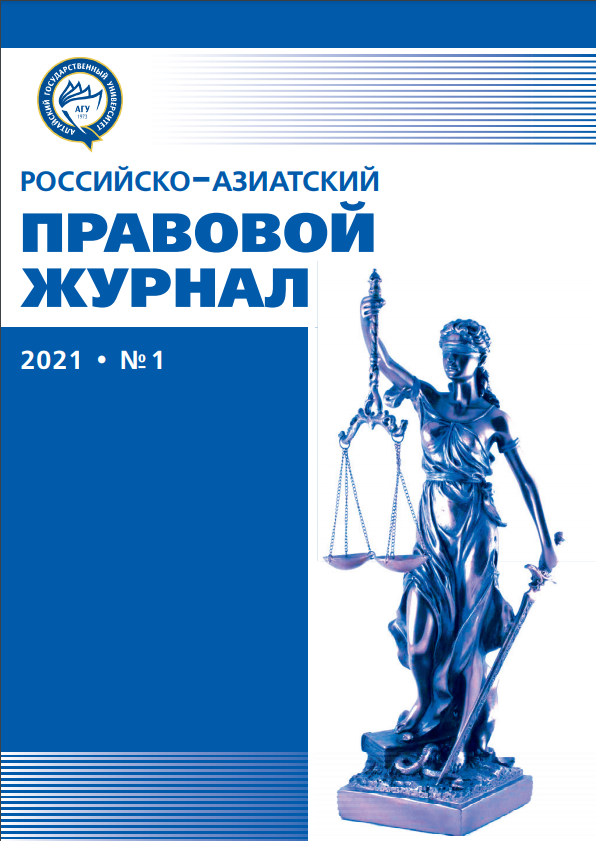SUBJECT OF CRIMES PROVIDED FOR IN ARTICLES 228, 228.1 OF THE CRIMINAL CODE OF THE RUSSIAN FEDERATION: GENERAL PROVISIONS
УДК 343.23 ББК 67.408
Abstract
The article deals with the debatable issues of the general criminal law characteristic of the subject ofdrug-related crimes. The meaning and place of narcotic drugs, psychotropic substances and plant-baseddrugs referred to in articles 228 and 228.1 of the Criminal Code of the Russian Federation in the crime aredetermined on the basis of the provisions of the study on the subject of the crime. The reasonable conclusionis that these drugs, substances and plant-based drugs belong to the subject of the crime as a separate sign ofcorpus delicti. Views on the definition and signs of the subject of drug-related crimes are summarized. Thecontent of the signs of the subject of crimes under articles 228 and 228.1 of the Criminal Code of the RussianFederation is specified. The problem of the terminological designation of the subject of the crime is raisedin articles 228 and 228.1 of the Criminal Code of the Russian Federation.
Downloads
References
2. Фролов Е.А. Объект уголовноправовой охраны и его роль в организации борьбы с посягательствами на социалистическую собственность : автореф. дис. … д-ра юрид. наук. Свердловск, 1971. 53 с.
3. Кравцов С.Ф. Предмет преступления : автореф. дис. … канд. юрид. наук. Л., 1976. 19 с.
4. Глистин В.К. Проблема уголовно-правовой охраны общественных отношений (объект и квалификация преступлений). Л. : Изд-во ЛГУ, 1979. 127 с.
5. Российское уголовное право. Общая часть : учебник для вузов / под ред. В.С. Комиссарова. СПб. : Питер, 2008. 720 с.
6. Мурашов Н.Ф. К вопросу о предмете наркопреступления по уголовному законодательству России // Наркоконтроль. 2013. №3. С. 14–18.
7. Винокуров В.Н. Предмет преступления: отличие от смежных понятий // Журнал российского права. 2011. №12. С. 56–63.
8. Таций В.Я. Объект и предмет преступления в советском уголовном праве. Харьков : Выща шк., изд-во при Харьков. гос. ун-те, 1988. 196 с.
9. Кудрявцев В. Н. Общая теория квалификации преступлений; 2-е изд., перераб. и доп. М. : Юристъ, 2006. 304 с.
10. О судебной практике по делам о преступлениях, связанных с наркотическими средствами, психотропными, сильнодействующими и ядовитыми веществами : постановление Пленума Верховного суда РФ от 15.06.2006 №14 (ред. от 16.05.2017) // Верховный суд РФ. URL: https://vsrf.ru/documents/own/?year=2006
11. Егорова Т.И. Уголовная ответственность за незаконный оборот наркотических средств, психотропных веществ или их аналогов (ст. 228–228.1 УК РФ) : монография. М. : Юрлитинформ, 2016. 184 с.
12. Дрозд А.Н. К вопросу о предмете преступлений, связанных с незаконным оборотом наркотических средств, психотропных веществ, их прекурсоров или аналогов // Судебная экспертиза Беларуси. 2017. №2 (5). С. 31–36.
13. Щербаков А.Д. Наркотики в России и США: уголовно-правовой аспект : монография. М. : Юрлитинформ, 2016. 232 с.
14. Кромова А.Я. Контрабанда наркотиков (ст. 229.1 УК РФ) : монография / под ред. С.М. Кочои. М. : Проспект, 2014. 136 с.
15. Панова Е. В. Предмет преступлений, связанных с незаконным оборотом наркотических средств и психотропных веществ : дис. … канд. юрид. наук. М., 2005. 185 с.
16. Международная классификация болезней МКБ-10: вступила в силу 01.01.1999 // «КонсультантПлюс». URL: http://www.consultant.ru.
Russian-Asian Law Journal is a golden publisher, as we allow self-archiving, but most importantly we are fully transparent about your rights.
Authors may present and discuss their findings ahead of publication: at scientific conferences, on preprint servers, in public databases, and in blogs, wikis, tweets, and other informal communication channels.
Russian-Asian Law Journal allows authors to deposit manuscripts (currently under review or those for intended submission) in non-commercial, pre-print servers such as ArXiv.
Authors who publish with this journal agree to the following terms:
- Authors retain copyright and grant the journal right of first publication with the work simultaneously licensed under a Creative Commons Attribution License that allows others to share the work with an acknowledgement of the work's authorship and initial publication in this journal.
- Authors are able to enter into separate, additional contractual arrangements for the non-exclusive distribution of the journal's published version of the work (e.g., post it to an institutional repository or publish it in a book), with an acknowledgement of its initial publication in this journal.
- Authors are permitted and encouraged to post their work online (e.g., in institutional repositories or on their website) prior to and during the submission process, as it can lead to productive exchanges, as well as earlier and greater citation of published work (See The Effect of Open Access).








